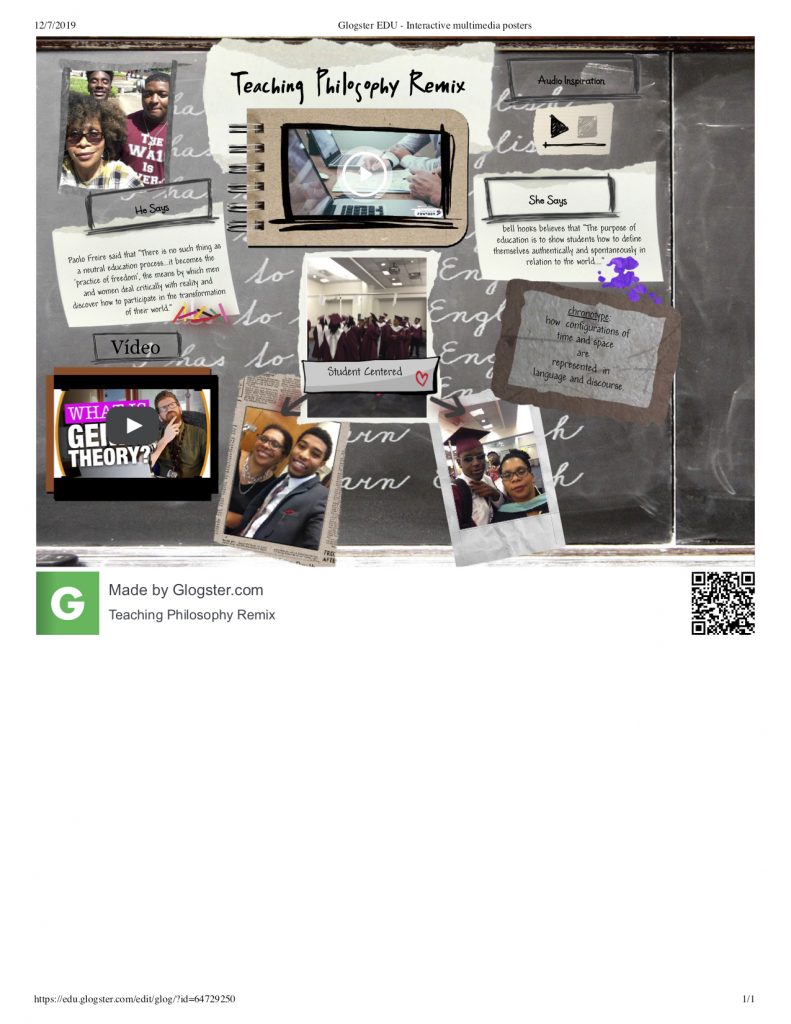Author and academic scholar bell hooks believes that, “Teaching is a performative act. And it is that aspect of our work that offers the space for change, invention, spontaneous shifts, that can serve as a catalyst drawing out the unique elements in each classroom.” Accordingly, an apropos metaphor for teaching is to compare it to genre which are “dynamic rhetorical forms that develop from responses to recurrent situations and serve to stabilize experience and give it coherence and meaning.”
Being an effective teacher requires an ongoing praxis of adaptability, fluidity, and sensitivity through pedagogical decisions that address–not compromises–who the students are, how the students learn, and what the best methods work best. This is what teaching is all about and I hang my hat on a philosophy that centers on adapting my methodologies to meet students where they are.
Paolo Freire said that “There is no such thing as a neutral education process…it becomes the ‘practice of freedom’, the means by which men and women deal critically with reality and discover how to participate in the transformation of their world.” Students cannot be educated successfully unless they are part of the process which is why Freire’s principles steer my centered pedagogy towards expressivist, cultural studies, post-process writing, and WAC/WID methods; as well, my teaching philosophy hinges on raising the equity bar by providing students opportunities to learn in ways that accommodate varying educational abilities when it comes to instruction and assessments.
Although I am a teacher, it is important to be a student-teacher, too, which propels me to continue to develop my craft by serving as a team leader for The College of William and Mary’s SURN (School-University Network Program) operating as a writing fellow for ODU’s Tidewater Writing Project, receiving my M.Ed. from UVA’s Curry School of Education, and attaining my National Board Teachers Certification; in this vain I operate in that space that allows my abilities to evolve—change instead of stagnant; inventive instead of academic; expressivist instead of pedestrian.
For example, instead of facilitating a novel unit where the endgame is a book report, students read a selected novel then develop a real-world solution to a problem presented in that novel, the argue the need their initiative to a panel of alumni students and select administrators, using visual ancillaries. Instead of students composing a third-person research paper, they compose an I Search paper on the evolution of a music genre of their choice from the time they were born up to today. These assignments are were not just about “fun or creativity” but honoring the student’s beliefs and abilities and challenging them to learn the writing craft inventively and useful across disciplines as well as to learn how to adapt writing styles what is expected of particular genres.

I realize that, in the public school setting, being a teacher of writing nowadays is not as much about learning and empowerment as much as it is about data and conformity; as such I philosophically feel obligated to “go rogue,” meaning implement teaching methods outside the lines so as to respect and accommodate the needs of my students academically.
Russian literary scholar M.M. Bakhtin remixed the definition of the word chronotype to mean how configurations of time and space are represented in language and discourse. This is profound to me as a teacher because the root of the word listen is “to honor” and my teaching philosophy revolves around listening to and being aware of the ever-evolving language and discourse needs of my students and not being stuck in one pedagogical spot. In the end, like Freire, my philosophy is that I believe as a writing teacher I can do much more than teach students the conventions; I can help students perceive, understand, and even change their situations to become better writers and adaptable, successful students.
Works Referenced
Bawarshi, Anis and Mary Jo Reiff. Genre: An Introduction to History, Theory, Research, and Pedagogy. Parlor Press: Indiana, 2010. Print.
Costello, Kristi. “Rhetorical Genre Studies Power Point” 29 October 2019.
Costello, Kristi “Statement of Teaching Philosophy and Experience.”
Devitt, Amy J. “Genre Pedagogies.” A Guide to Composition Pedagogies. 2nd ed. Ed.
Freire, Paolo. Wikipedia, The Free Encyclopedia. 17 Sept. 2019.
Hooks, Bell. Teaching to Transgress: Education as the Practice to Freedom. New York: Routledge 1994.
Reid, Shelly. “Quick Guides for Writing Teachers: “Writing a Teaching Philosophy Statement.”
REMIX
https://edu.glogster.com/glog/teaching-philosophy-remix/2vjfep82t18
